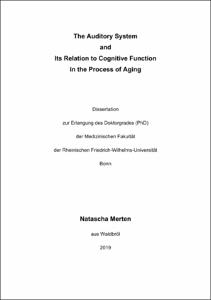The Auditory System and Its Relation to Cognitive Function in the Process of Aging

The Auditory System and Its Relation to Cognitive Function in the Process of Aging

| dc.contributor.advisor | Breteler, Monique | |
| dc.contributor.author | Merten, Natascha | |
| dc.date.accessioned | 2020-04-25T17:25:33Z | |
| dc.date.available | 2022-05-15T22:00:23Z | |
| dc.date.issued | 07.05.2019 | |
| dc.identifier.uri | https://hdl.handle.net/20.500.11811/7714 | |
| dc.description.abstract | Age-related hearing loss is a disabling condition that has been associated with many other negative health outcomes. Age-related hearing loss prevalence is high and strongly increases with age. Given the aging of western populations, hearing loss poses an increasing public health burden. The Rhineland Study is a large prospective cohort study that investigates age-related and neurodegenerative diseases and is well suited to investigate age-related hearing loss. The main aim of this thesis was to gain insight into the etiology of and potential treatment strategies for age-related hearing loss. Specifically, I wanted to (1) assess to what extent hearing sensitivity and different cognitive functions influence central auditory processing across the adult life span in the population of the Rhineland Study; (2) investigate the benefit of motor synchronization on auditory performance and whether previous musical training and cortical thickness of specific brain regions relate to different aspects of this auditory-motor synchronization process in a student pilot population of the Rhineland Study; and (3) assess the temporal relations of hearing sensitivity, central auditory processing, and cognition by using longitudinal data from the Beaver Dam Offspring Study. In the cross-sectional analysis based on the Rhineland Study, I found that hearing sensitivity is most important for speech understanding in noise. Furthermore, crystallized intelligence and executive functions showed effects on speech understanding in noise as opposed to memory functions, which seemed less important for this ability. I concluded therefore that the ability to perceive speech signals seems to play a major role in speech understanding in noise. Higher-order cognitive functions may be beneficial at a later speech processing stage, with different involvement of different cognitive functions. In the experiment conducted in a student population, I identified a beneficial effect of motor synchronization on melody discrimination ability. Previous experience in musical training and anatomical variability of relevant brain regions were associated with different aspects of this auditory-motor synchronization. These results suggest improved perception of complex auditory stimuli with auditory-motor synchronization. Moreover, prior experience and structural brain differences influence the extent to which an individual can benefit from motor synchronization in a complex listening task. In the longitudinal analyses of the Beaver Dam Offspring Study data, I found that baseline hearing sensitivity more strongly affected later higher-order central auditory processing than vice versa. The associations between hearing and cognition were bidirectional and weak. This suggests that loss of hearing ability and cognitive decline may share a common cause rather than impairment in one function preceding and triggering impairment in the other. Therefore, hearing improvement may have only a limited benefit for prevention or delay of cognitive decline. In conclusion, the work in this thesis contributes to our understanding of the etiology of age-related hearing loss and its relation to cognitive decline. The findings in this thesis will be of benefit to future studies directed at deepening the knowledge on age-related hearing loss and the development of potential treatment strategies for age-related hearing loss. | |
| dc.language.iso | eng | |
| dc.rights | In Copyright | |
| dc.rights.uri | http://rightsstatements.org/vocab/InC/1.0/ | |
| dc.subject | Hörverlust | |
| dc.subject | Hören | |
| dc.subject | Kognition | |
| dc.subject | Denken | |
| dc.subject | Altern | |
| dc.subject | Hearing | |
| dc.subject | Hearing loss | |
| dc.subject | Hearing sensitivity | |
| dc.subject | Central auditory processing | |
| dc.subject | Speech in noise | |
| dc.subject | Cognition | |
| dc.subject | Cognitive decline | |
| dc.subject | Melody | |
| dc.subject | Synchronization | |
| dc.subject | Tapping | |
| dc.subject.ddc | 610 Medizin, Gesundheit | |
| dc.title | The Auditory System and Its Relation to Cognitive Function in the Process of Aging | |
| dc.type | Dissertation oder Habilitation | |
| dc.publisher.name | Universitäts- und Landesbibliothek Bonn | |
| dc.publisher.location | Bonn | |
| dc.rights.accessRights | openAccess | |
| dc.identifier.urn | https://nbn-resolving.org/urn:nbn:de:hbz:5-54480 | |
| ulbbn.pubtype | Erstveröffentlichung | |
| ulbbnediss.affiliation.name | Rheinische Friedrich-Wilhelms-Universität Bonn | |
| ulbbnediss.affiliation.location | Bonn | |
| ulbbnediss.thesis.level | Dissertation | |
| ulbbnediss.dissID | 5448 | |
| ulbbnediss.date.accepted | 30.04.2019 | |
| ulbbnediss.fakultaet | Medizinische Fakultät | |
| dc.contributor.coReferee | Cruickshanks, Karen J. | |
| ulbbnediss.date.embargoEndDate | 15.05.2022 | |
| ulbbnediss.contributor.gnd | 1262933129 |
Files in this item
This item appears in the following Collection(s)
-
E-Dissertationen (1614)




